简单又好做的松饼,分分钟搞定!
How to Make Fast and Easy Pancakes
Co-authored by wikiHow Staff
There's nothing better than a stack of hot, fluffy pancakes to get your morning started. Most people think pancakes are too much preparation and work to serve as a quick breakfast, but they don't have to be. You can whip up a batch up delicious flapjacks in as little as fifteen minutes by keeping the necessary ingredients on hand, mixing up a simple batter and cooking several pancakes to perfection at a time.
Ingredients
1 cup flour
2 tsps baking powder
2 tsps sugar
Pinch of salt
3 / 4 cup milk
1 egg (beaten)
2 tbsps canola or vegetable oil
2 - 3 tbsps butter (as a substitute for oil)
Part 1 : Mixing the Batter
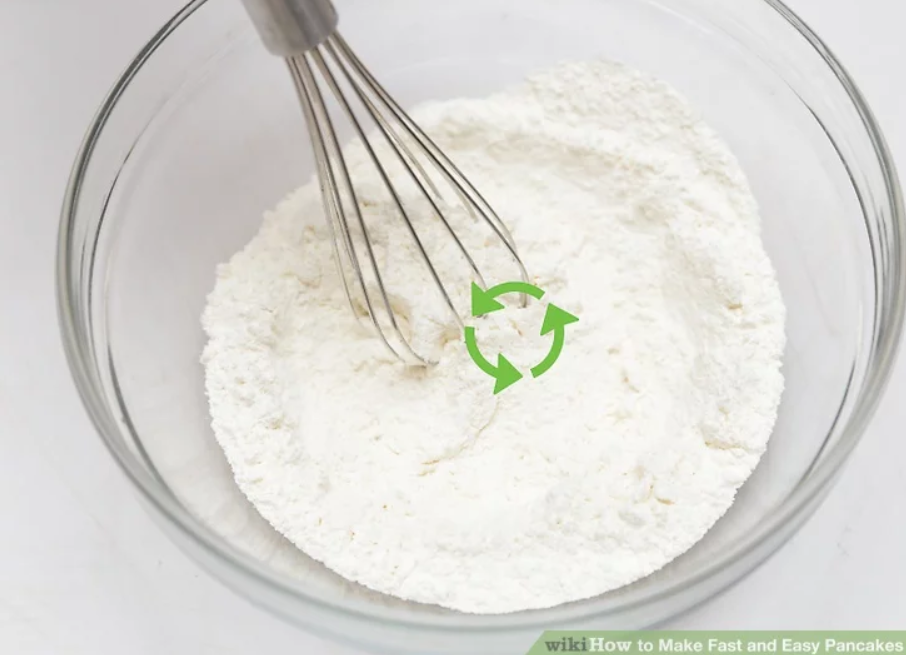 1. Measure out your dry ingredients.
In a large mixing bowl, combine 1 cup of flour, 2 teaspoons baking powder, 2 teaspoons sugar and a pinch of salt. Stir the dry ingredients together until they're evenly distributed. Use the bottom of a spoon or ladle to press a small well into the center of the dry mix to make mixing in the other ingredients easier.
1. Measure out your dry ingredients.
In a large mixing bowl, combine 1 cup of flour, 2 teaspoons baking powder, 2 teaspoons sugar and a pinch of salt. Stir the dry ingredients together until they're evenly distributed. Use the bottom of a spoon or ladle to press a small well into the center of the dry mix to make mixing in the other ingredients easier.
• Baking powder is optional, but will produce fluffier pancakes that rise better during the cooking process.
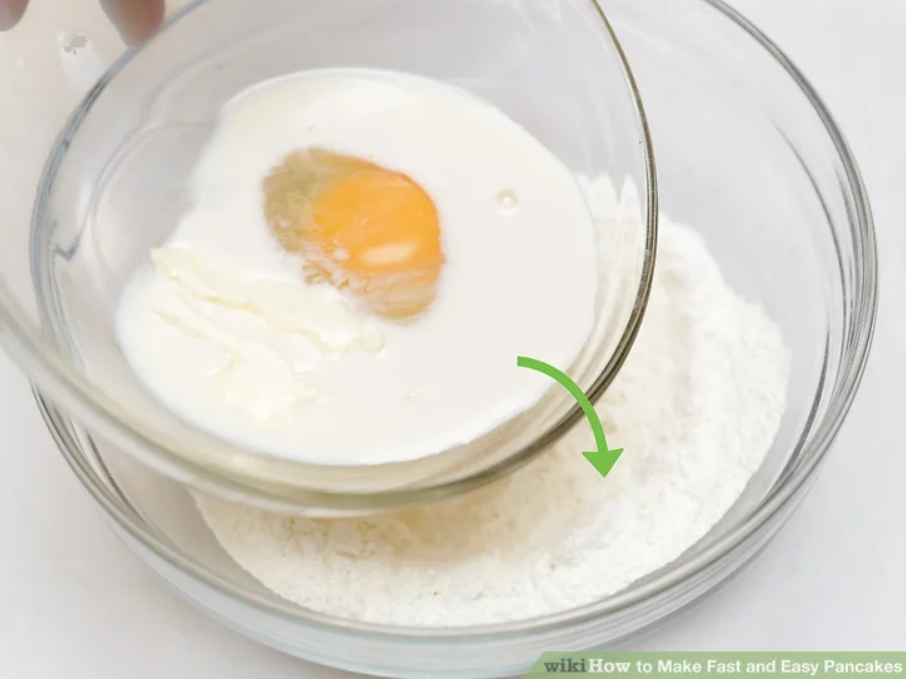 2. Add milk and an egg.
Crack one egg into the well you made in the dry ingredients. Pour roughly 3 / 4 cup of milk into the well. Stir the the egg and milk into the dry ingredients, making sure to beat the egg. For a thicker batter, use slightly less milk.
2. Add milk and an egg.
Crack one egg into the well you made in the dry ingredients. Pour roughly 3 / 4 cup of milk into the well. Stir the the egg and milk into the dry ingredients, making sure to beat the egg. For a thicker batter, use slightly less milk.
• Add the milk slowly and gradually while you stir. If the batter comes out thicker than you like, you can always add another ounce. If you use too much, however, you'll have to add more flour, which will throw the recipe off.
• Some people also like to add about a teaspoon of oil to the batter itself. This can help the ingredients hold together better once they've been mixed.
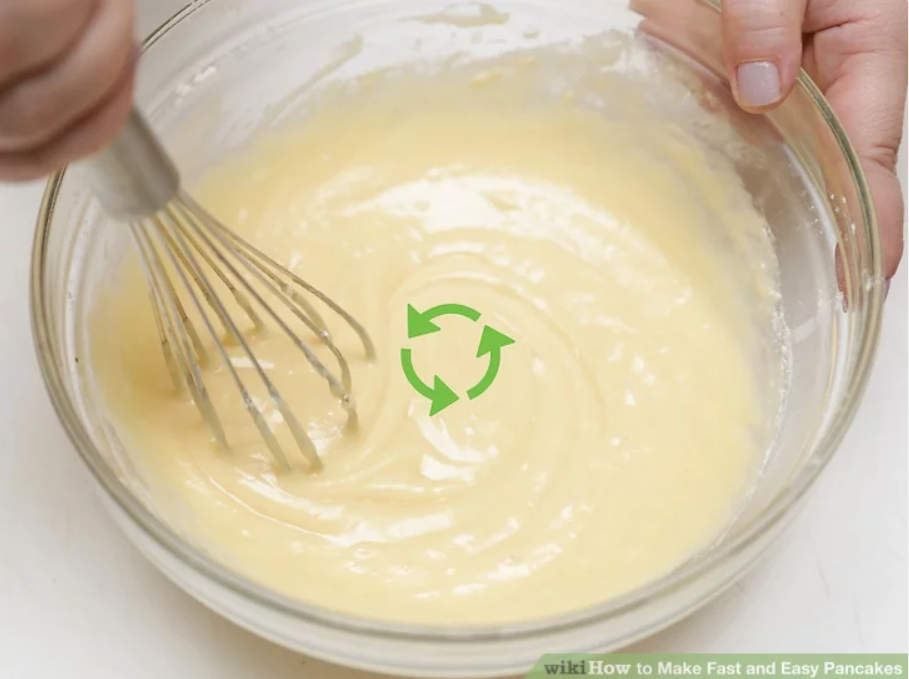 3. Whisk until the batter thickens.
Whisk the ingredients together vigorously until it becomes a batter. Try to break up as many of the lumps of flour and baking powder as you can. The batter should be smooth and have a thick, creamy consistency when it's done.
3. Whisk until the batter thickens.
Whisk the ingredients together vigorously until it becomes a batter. Try to break up as many of the lumps of flour and baking powder as you can. The batter should be smooth and have a thick, creamy consistency when it's done.
• Be careful not to overmix your batter. This can make the pancakes slightly tough and rubbery after they're cooked.
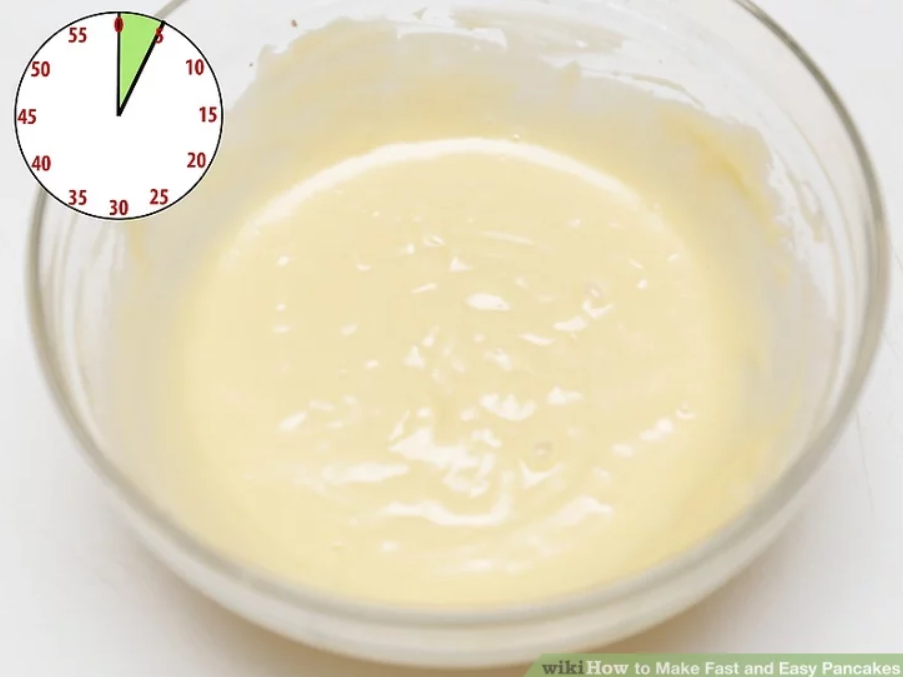 4. Let the batter rest for a few minutes.
Set a timer for 3-5 minutes and give the batter time to rest. As it sits, it will continue to set up and thicken. Stir the batter occasionally to eliminate air bubbles. While you're letting the batter rest, you can begin preparing your cooking surface.
4. Let the batter rest for a few minutes.
Set a timer for 3-5 minutes and give the batter time to rest. As it sits, it will continue to set up and thicken. Stir the batter occasionally to eliminate air bubbles. While you're letting the batter rest, you can begin preparing your cooking surface.
• Resting the batter gives the starches time to relax after whisking them together so that the pancake will turn out light and fluffy.
• This is a good time to add other ingredients to your pancake batter, such as chocolate chips, blueberries, coconut, etc.
Part 2 : Preparing Your Cooking Surface
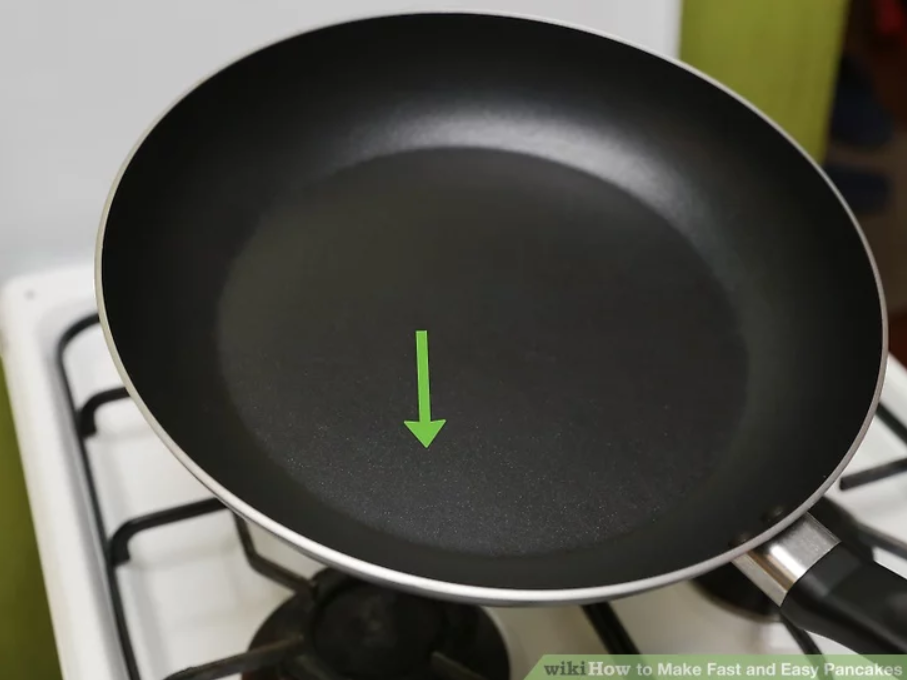 1. Ready a large griddle or skillet.
Find a surface to cook your pancakes on. Choose a griddle or skillet that is flat and large enough to cook several pancakes at once. Place the skillet on the cooktop and have the batter and the rest of your ingredients close by.
1. Ready a large griddle or skillet.
Find a surface to cook your pancakes on. Choose a griddle or skillet that is flat and large enough to cook several pancakes at once. Place the skillet on the cooktop and have the batter and the rest of your ingredients close by.
• If the cooking surface you're using isn't very large, you'll either have to make smaller pancakes or cook fewer at a time.
• Avoid saute-style pans with sloped edges. These can mess up the shape of the pancake and leave you with no room to flip them.
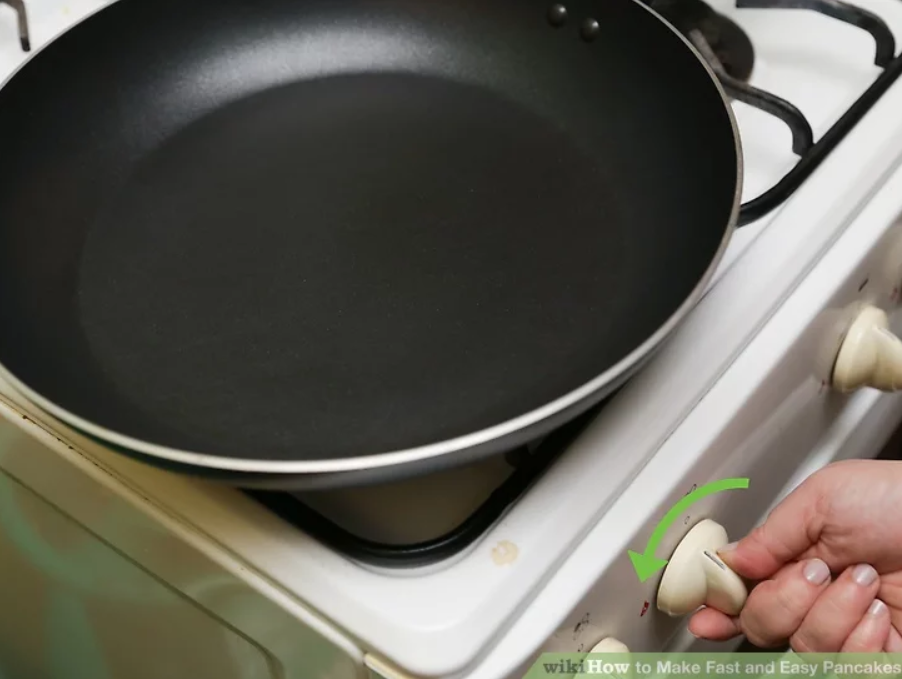 2. Turn on the stove to a medium heat.
Let the cooktop begin to warm up the skillet or griddle. It's essential to bring the cooking surface to the right temperature. If it's too hot, the pancake batter is likely to burn, while if it's not hot enough it can take much longer to cook and may leave the pancakes spongy in the middle even when they appear done on the outside.
2. Turn on the stove to a medium heat.
Let the cooktop begin to warm up the skillet or griddle. It's essential to bring the cooking surface to the right temperature. If it's too hot, the pancake batter is likely to burn, while if it's not hot enough it can take much longer to cook and may leave the pancakes spongy in the middle even when they appear done on the outside.
• The cooking surface will grow hotter the longer it's exposed to direct heat, so it's a good idea to turn it down a little after your first round of pancakes are done.
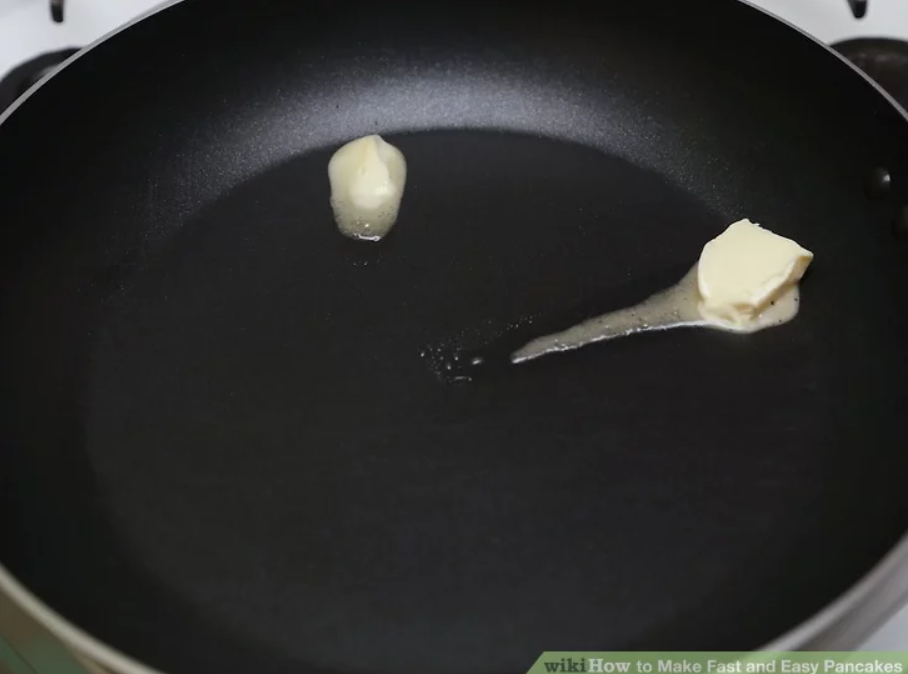 3. Heat 1tbsp of oil or butter in the skillet.
Pour about 2 tablespoons of canola oil into the skillet, or use 2-3 tablespoons of butter, or a combination of the two. Heat the oil or let the butter melt in the skillet, making sure to coat the entire cooking surface. Wait until just before the butter or oil begins to sizzle before adding the pancake batter.
3. Heat 1tbsp of oil or butter in the skillet.
Pour about 2 tablespoons of canola oil into the skillet, or use 2-3 tablespoons of butter, or a combination of the two. Heat the oil or let the butter melt in the skillet, making sure to coat the entire cooking surface. Wait until just before the butter or oil begins to sizzle before adding the pancake batter.
• If you're using oil to cook pancakes, canola or vegetable oil will work best, as they'll lubricate the skillet and cook the pancakes evenly without influencing their flavor.
• Cooking with butter is fine, but it can give the pancakes a denser, crispier outer texture once it cooks in. Wipe out the pan and add new butter after each batch to keep from burning it.
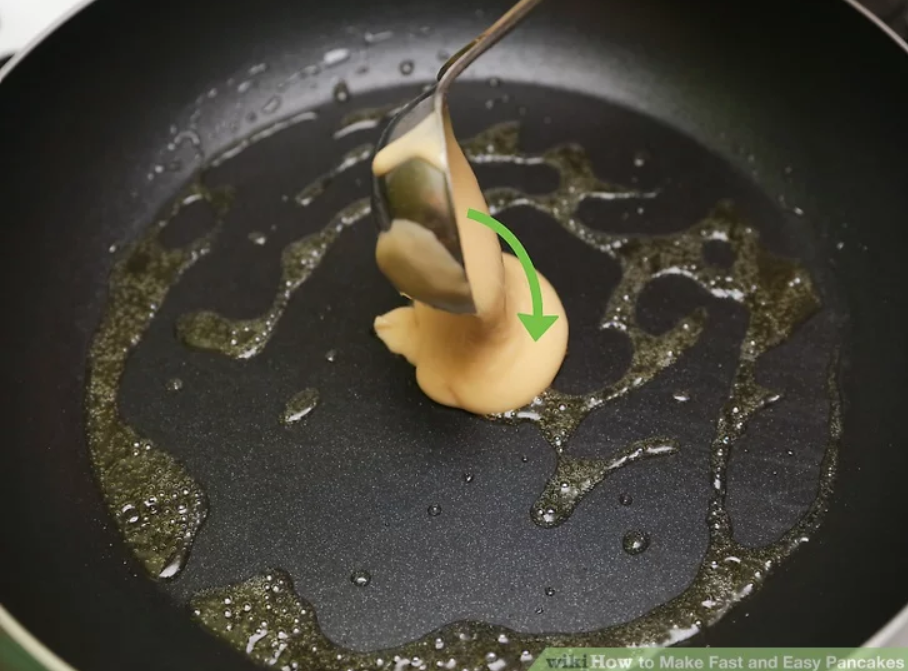 4. Ladle on the pancake batter in small circles.
Use a deep ladle to pour the pancake batter onto the hot cooking surface. Aim to make each pancake 3 - 4 inches in diameter. On a large enough cooking surface, you'll be able to cook up to 4 pancakes at a time. Keep the edges of the batter separated so the pancakes don't stick together.
4. Ladle on the pancake batter in small circles.
Use a deep ladle to pour the pancake batter onto the hot cooking surface. Aim to make each pancake 3 - 4 inches in diameter. On a large enough cooking surface, you'll be able to cook up to 4 pancakes at a time. Keep the edges of the batter separated so the pancakes don't stick together.
• Keep the pancakes compact. Pancakes that are too big will be difficult to flip.
• Don't use too much batter for a single pancake, or the outside will get done while the inside is still goopy.
Part 3: Cooking and Serving the Pancakes
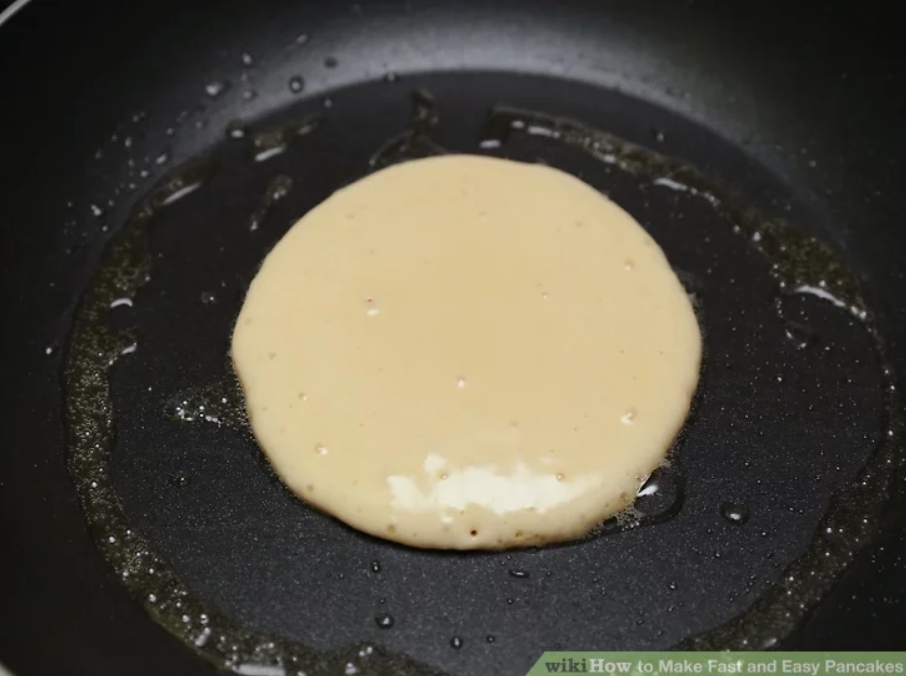 1. Cook the pancakes until they begin to bubble.
Depending on the heat of the skillet and the size of the pancakes, they'll need to cook for somewhere between 30 seconds and a minute on each side. Once bubbles begin to form in the wet batter on the top of the pancake, it's time to turn them over. Look for the edges to solidify and brown ever so slightly before flipping them.
1. Cook the pancakes until they begin to bubble.
Depending on the heat of the skillet and the size of the pancakes, they'll need to cook for somewhere between 30 seconds and a minute on each side. Once bubbles begin to form in the wet batter on the top of the pancake, it's time to turn them over. Look for the edges to solidify and brown ever so slightly before flipping them.
• Bubbles indicate that the first side of the pancake is done and that heat is trying to escape through the other side.
• Slide your spatula under each pancake after they've been cooking for a few moments to make sure they don't stick to the skillet.
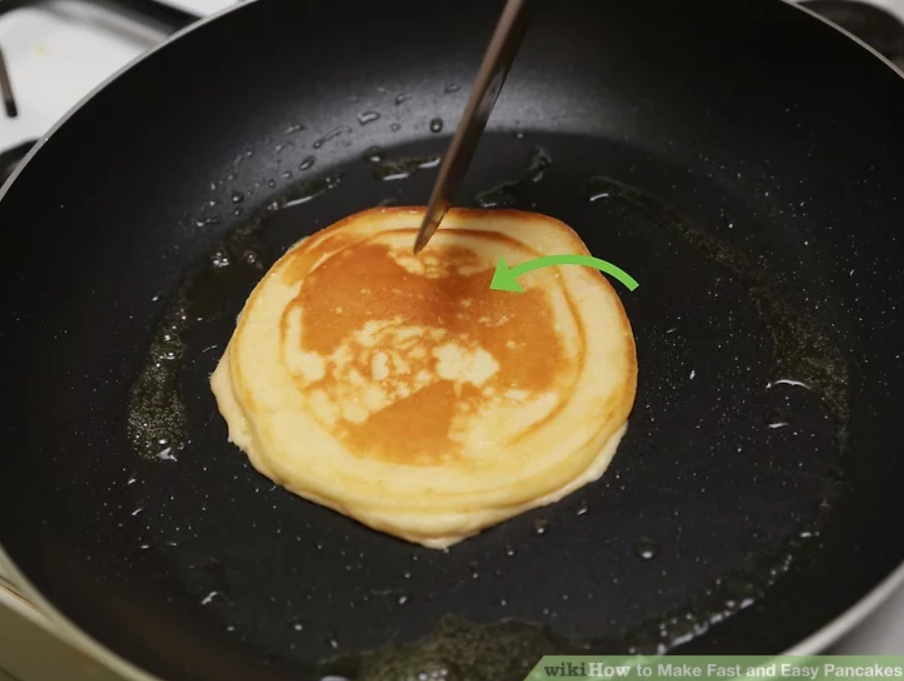 2. Flip the pancakes over and continue cooking on the other side.
Flip each pancake over with a spatula. Let the pancakes cook for another 20-30 seconds on the opposite side. Because they've already been partially cooked through, they won't take long to get done after you flip them. Keep an eye on the underside of the pancakes to make sure they don't burn.
2. Flip the pancakes over and continue cooking on the other side.
Flip each pancake over with a spatula. Let the pancakes cook for another 20-30 seconds on the opposite side. Because they've already been partially cooked through, they won't take long to get done after you flip them. Keep an eye on the underside of the pancakes to make sure they don't burn.
• Flip the pancakes over in one fluid motion to prevent breaking them or making a mess.
• After flipping the pancakes, lift up one edge and peek at the bottom to gauge their progress.
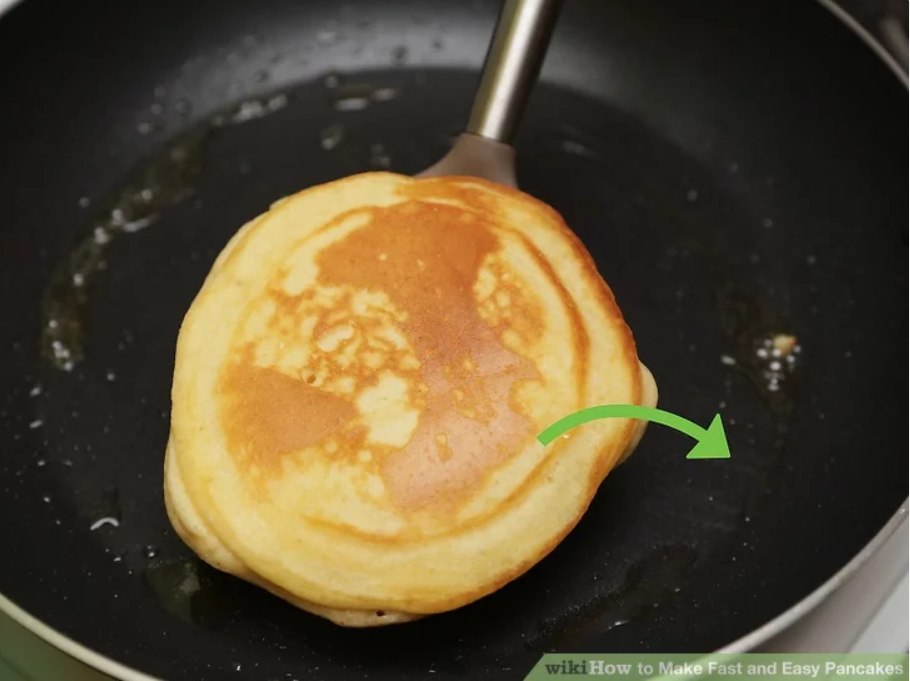 3. Remove the pancakes from the heat when they're golden brown.
Once both sides are a nice golden brown, take them out of the skillet and divvy them up amongst your hungry eaters. Start a second batch to use up whatever batter you have left over. If necessary, add a little more butter or oil to the skillet. Otherwise, the outside of the pancakes will be more likely to burn.
3. Remove the pancakes from the heat when they're golden brown.
Once both sides are a nice golden brown, take them out of the skillet and divvy them up amongst your hungry eaters. Start a second batch to use up whatever batter you have left over. If necessary, add a little more butter or oil to the skillet. Otherwise, the outside of the pancakes will be more likely to burn.
• Some people may like their pancakes slightly more brown or a little undercooked. Cook the pancakes until they're done enough to suit your tastes.
 4. Serve with your favorite toppings.
Stack your pancakes high and top them with a square of butter or a drizzle of maple syrup or honey. You could also choose to add whipped cream, fresh fruit, nuts, jam, chocolate chips or even crushed candy pieces. Pancakes are a fun, easy morning treat that can be customized to even the pickiest eater's liking.
4. Serve with your favorite toppings.
Stack your pancakes high and top them with a square of butter or a drizzle of maple syrup or honey. You could also choose to add whipped cream, fresh fruit, nuts, jam, chocolate chips or even crushed candy pieces. Pancakes are a fun, easy morning treat that can be customized to even the pickiest eater's liking.
• Give your pancakes a delicious theme, pairing classic fruit combinations like strawberry and banana, or make their flavor profiles more complex with additives like cinnamon, coconut or lemon zest.
• There are no rules. Almost anything can go on a steaming hot stack of pancakes!